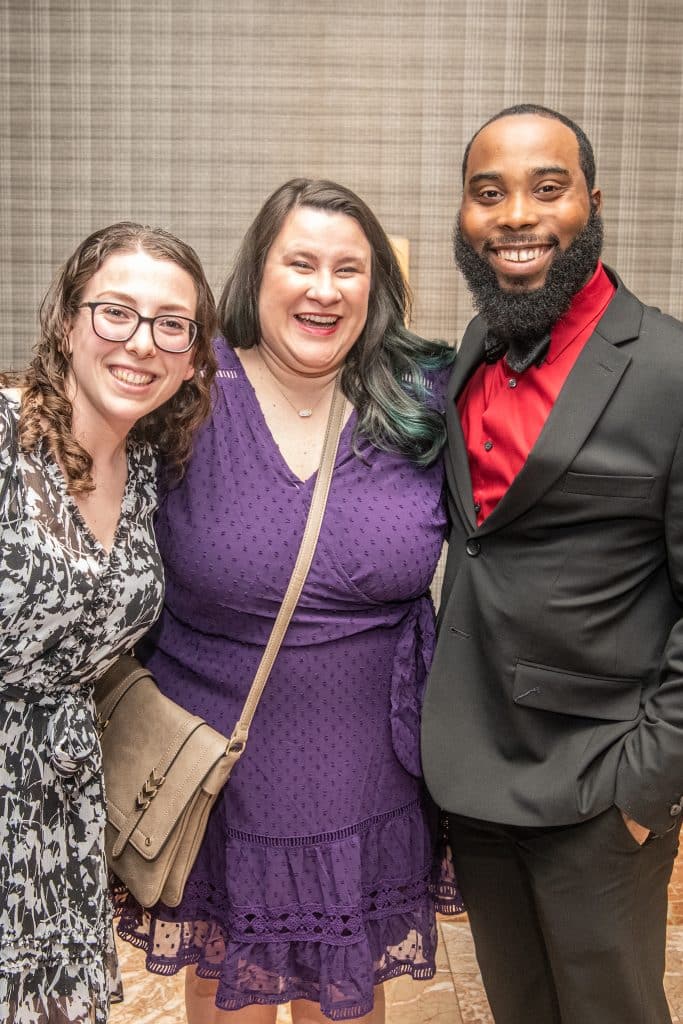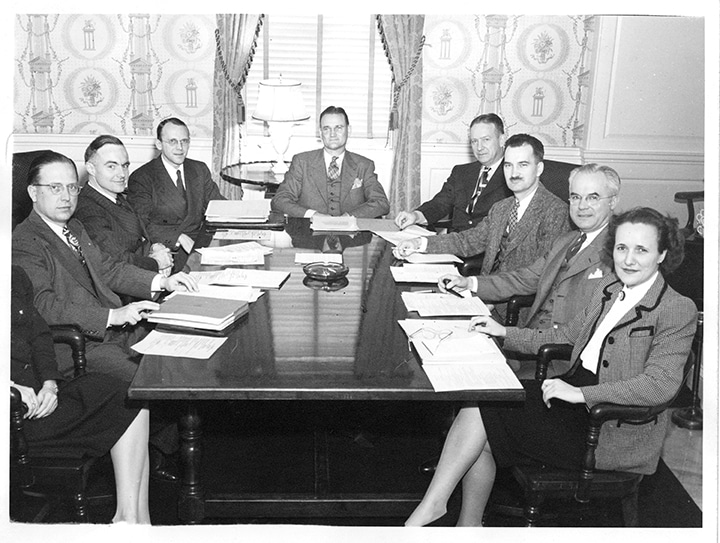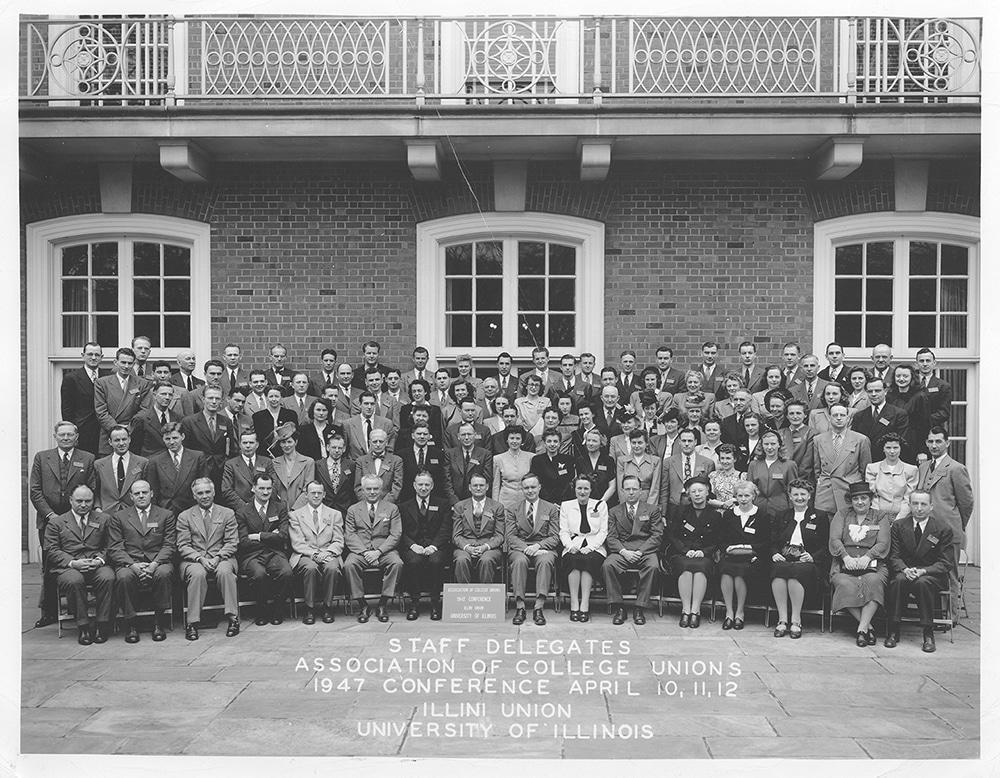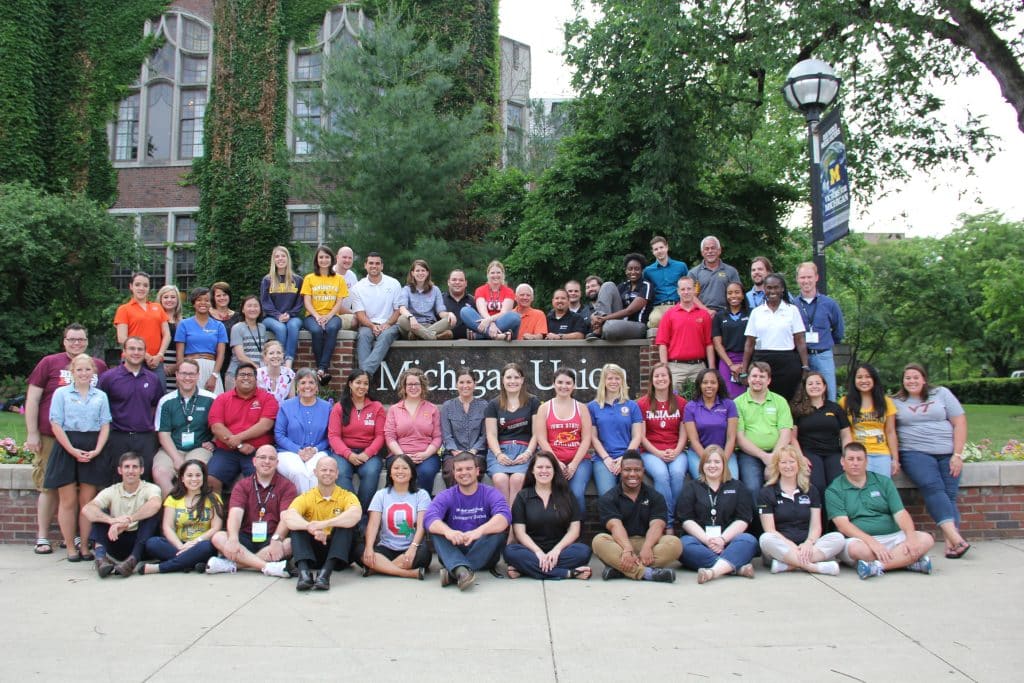about
ACUI is the professional home of thousands of campus community builders around the world.

Mission
ACUI’s mission is to support college union and student engagement professionals in their service to students and in the advancement of campus community.

Vision
ACUI’s vision is to advance campus community to positively change the world.

Values
These values guide our work: Community, Inclusion, Learning, and Innovation.
ACUI is the professional home to thousands of campus community builders around the world.
Primarily focused on the work of those within the college unions and student activities field, the Association strives to provide an inclusive, welcoming community for all those who choose to belong.
The organization’s full name is the Association of College Unions International, but ACUI is more commonly used by members.
Get to Know ACUI
Role of the College Union Statement
In the first half of the 20th century during the formation of the college union profession, concepts began to emerge about what role the college union should play for its campus and stakeholder community. The first role statement was adopted in 1956, and subsequently reaffirmed and updated in 1996 and in 2018. While the role statement serves as a foundational document for the profession to articulate fundamental tenets important to the profession, each campus adjusts its specific mission based on the campus community it serves.
The college union advances a sense of community, unifying the institution by embracing the diversity of students, faculty, staff, alumni, and guests. We bolster the educational mission of the institution and the development of students as lifelong learners by delivering an array of cultural, educational, social, and recreational programs, services, and facilities.
By any form or name, we serve as the heart of the campus community and create a welcoming environment by:
- Operating as a student-centered organization that engages in shared decision making and holistic development through employment and involvement.
- Advocating for inclusivity and equity, fostering respect, and affirming the identities of all individuals.
- Educating students in leadership and social responsibility and offering firsthand experiences in global citizenship.
- Providing gathering spaces to encourage formal and informal community interactions that build meaningful relationships.
Traditionally considered the living room, the college union enhances the student experience and cultivates an enduring connection to the institution.
2024–2029 Strategic Plan
Strategic Pillar 1: Pursue education, learning, research,
and initiatives that advance the field.
- Goal 1: Develop educational content to support the creation of inclusive communities.
- Goal 2: Curate existing and create new opportunities for undergraduate students, graduate students, and other professionals to learn about and grow into our profession.
- Goal 3: Create avenues for enhanced connection and alignment among the Education Council, Regional Conference, and Annual Conference planning teams.
- Goal 4: Enhance research in the field through the Assessment, Evaluation, Research, and Program Team.
Strategic Pillar 2: Reengage and support members
at the local level through active and revitalized regions.
- Goal 1: Effectively organize regional volunteer positions, recruit volunteers, and use labor force to strengthen regional engagement.
- Goal 2: Strengthen Regional Conferences by having a clearly identified core purpose, structure, and intended audience to drive content development and participation.
- Goal 3: Create and encourage avenues for regional engagement through regional community building opportunities, networking, and local educational experiences.
- Goal 4: Using the Role of the Regions statement as a baseline, actively communicate the role of the regions as an important conduit for entry and connection to ACUI.
About the Process
ACUI has been using strategic planning to guide the work of the Association since the early 1990s. In 2023, the Board of Trustees worked to create this strategic plan by gathering and analyzing data from member assessments, finances, member focus groups, and an environmental scan. The board also examined the Association’s mission, vision, and values. Following feedback sessions, the board finalized the mission, vision, values, strategic pillars, and initial goals for the 2024–29 plan. The new strategic plan was officially revealed at the Annual Conference Business Meeting in Denver on March 27, 2024. Over the course of the designated five-year period, members of the Leadership Team and volunteers from across the Association will work toward accomplishing tasks to contribute to the success of the larger strategic plan.
Strategic Pillar 3: Focus on opportunities for the engagement, retention, and growth of members and volunteers.
- Goal 1: Expand membership outreach to diverse member institutions.
- Goal 2: Enhance and develop internal communications to encourage accountability across volunteer teams.
- Goal 3: Enhance external marketing efforts to further articulate our value proposition.
- Goal 4: Refine and strengthen volunteer recruitment, engagement, and recognition efforts.
Strategic Pillar 4: Advance initiatives to support active dialogue and civic engagement on college campuses.
- Goal 1: Create collaborative partnerships with external associations and organizations that possess relevant expertise.
- Goal 2: Curate existing and create new resources to support member efforts that encourage active dialogue on their campus and help them to navigate associated contentious situations.
- Goal 3: Develop resources and opportunities to recognize and promote excellence in active dialogue and civic engagement.
- Goal 4: Explore resources to help campuses foster community building opportunities around difficult campus conversations.
Cross-Cutting Commitments
Commitment to the principles of inclusion, equity, belonging, and justice across all communities.
Commitment to accountability and stewardship in order to ensure the financial sustainability of ACUI.
Commitment to the advancement of workforce development as we shape the future of the profession.
History
As one of the oldest higher education associations, ACUI dates back to 1914 when it was founded in the Midwestern United States by six students and one faculty advisor who were interested in learning how other universities were managing college union organizations.

early years
Professional staff and student leaders met annually to share ideas and discuss common challenges. Diversity can be noted even in those early years as the Association’s first president was J.B. Bickersteth of the University of Toronto and an early leader, Edith Ouzts Humphreys of Cornell University, would go on to publish the Association’s first book. Now namesakes of ACUI’s highest award, Porter Butts and Edgar Whiting ran the organization, keeping its finances, planning conferences, lobbying the government, and publishing resources.
a movement
Following World War II, as campus enrollments surged, college unions were built to meet students’ cocurricular needs. ACUI began holding seminars and regional programs to reach its expanding membership. It even had an architect available for consultation as institutions constructed new facilities. In 1968, ACUI hired its first paid staff member, Chester Berry, and established an office at Stanford University. He would be the first of five chief executives to oversee the Association during its history.


leadership
In the late 20th century, ACUI became more like the association we know today. In 1972, Shirley Bird Perry of the University of Texas at Austin became the first woman president and in 1984 LeNorman Strong of Cornell University became the first president of color. Also during this time, identity and equity concerns led to the creation of interest-based committees and task forces. Meanwhile, the Association’s programs grew to focus on student leadership, many types of recreational activities, and professional managerial concerns such as budgeting, renovation, and staffing.
A New Century
In the 2000s, ACUI reinvented itself as a knowledge-based organization and developed core competencies. In addition to educational programs, research and new services such as Procure and Promos help to stretch the benefit of membership. Today, ACUI is a nonprofit 501(c)3 headquartered in Bloomington, Indiana. Its workforce includes 20 paid staff members and more than 450 volunteers.

